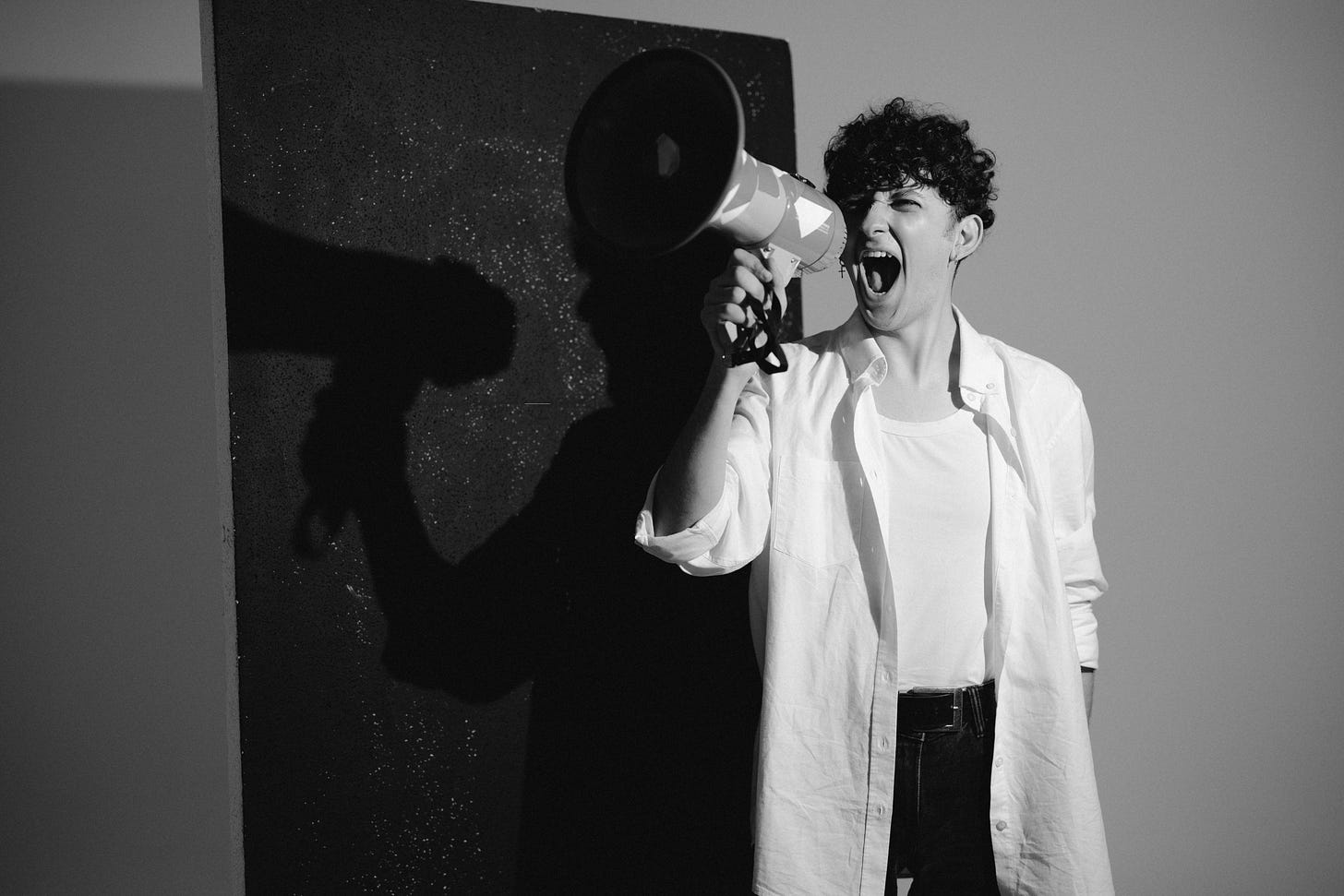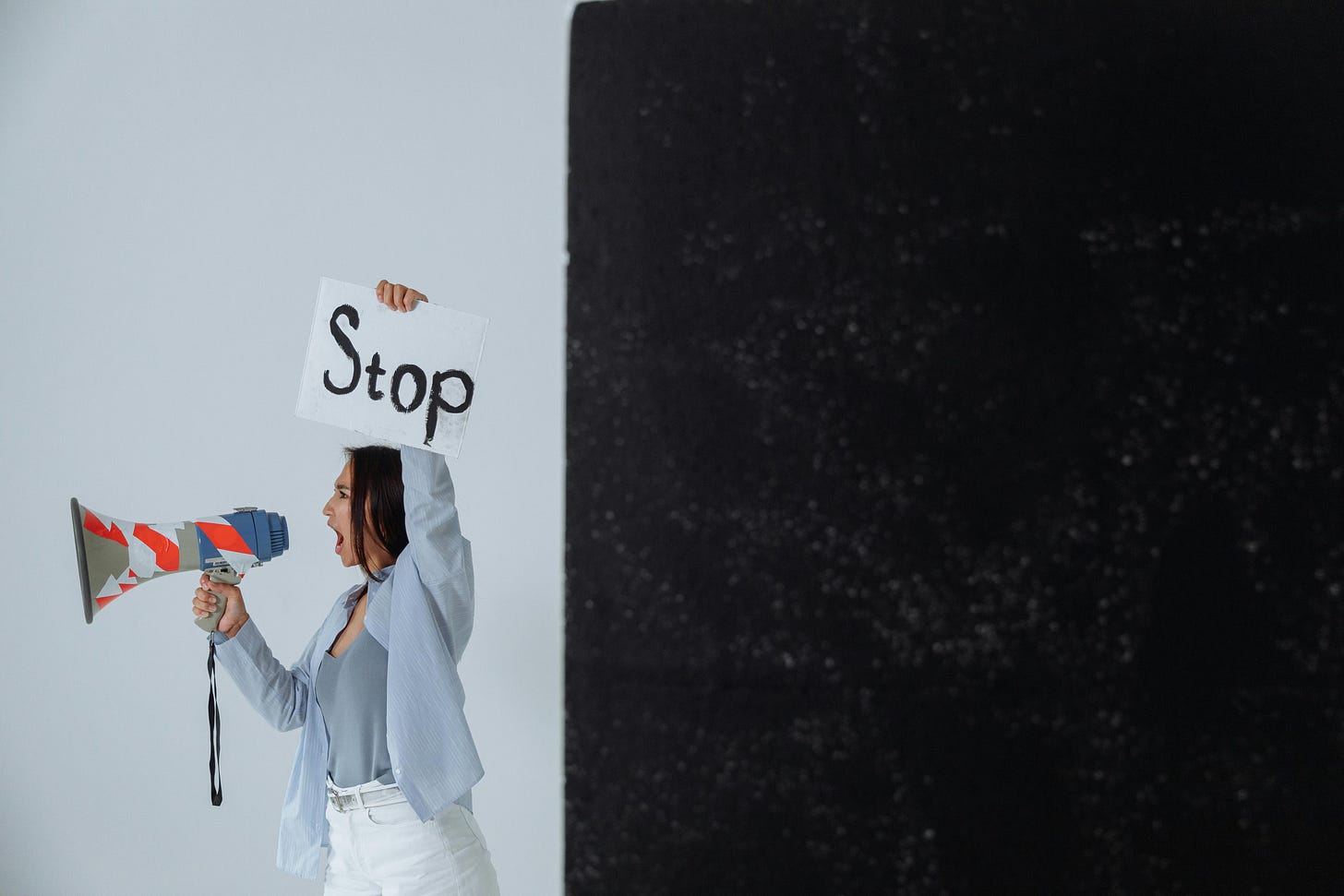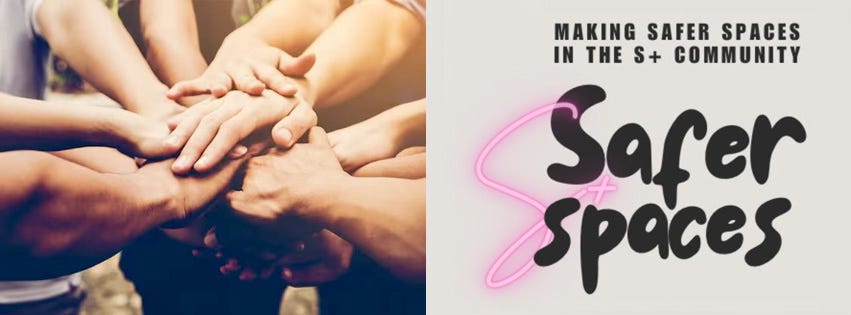Content Note: Reference made to CSA and other forms of abuse.
Preamble
Exploring the complexities of Calling Out vs. Calling In.
Oof! It’s hard to write a piece about such a nuanced and complex subject such as this. Bear with me as I try to make sense of it (pun unintended), because whatever we might think of Call-Out Culture, calling others out for abuse or problematic behaviours isn’t by itself toxic, but the way some have appropriated it certainly is.
Many do so with little awareness of how calling out feeds the fire of unresolved trauma – the expression of unresolved and otherwise unexpressed rage.
Don’t get me wrong – that rage is entirely appropriate when we consider both the personal and the societal/ institutional abuses that are experienced by so many, on a daily basis.
But what I’m interested in exploring in this article is how calling out can get in the way of calling others in to accountability processes. Because if we can’t hear feedback, if we don’t hold ourselves accountable and take responsibility for our actions, if we simply get defensive to protect ourselves from attacks, then we don’t get to heal anything in ourselves or in our communities.
There is, absolutely, a place for calling out, but I contend that this shouldn’t replace first calling others in.
There is, absolutely, a place for calling out, but I contend that this shouldn’t replace first calling others in.
How we best do that is another question. I would love to hear suggestions and examples of calling in that centred the common humanity of everyone involved, and led to positive outcomes.
Let’s look at calling out first, with a basic and fundamental assertion – one that should never need stating or debating.
Always Centre the Victim.
No question.
It’s interesting to note how far we have come in questioning binaries, but the question of victim vs perpetrator is so loaded that these conversations often remain in the world of you’re either with us or against us. But in acknowledging that hurt people hurt people, the question becomes immediately more complex.
Now, the way trauma can show up, to impact our behaviours, perceptions and memory (scans show how parts of the brain literally go dark when we are triggered), brings an important level of nuance and complexity to the conversation, but I have come to an important realisation in the years I have been working on both myself and with others…
We all carry trauma with us!
We might not recognise it. We might try to dismiss it. But it is there.
At some level, it is perhaps even unavoidable.
In the book I have been writing the past couple of years, Feminism Will Make a Man Out of You!, this is a central premise – the notion that patriarchy is the first and original trauma that we experience as young boys and men. It looks at how shame is used as a tool to exile our sensitive, feeling and empathic selves, and the impacts that has on everyone and everything around us.
Add to that the unavoidable truth that, as the autonomous and sovereign beings we are, at some point our wants and needs will be at odds with someone else’s. Conflict is unavoidable!
Conflict is simply a part of life. It’s what happens next that matters most. It’s what happens next that can open the door to processes of repair, where we can build closer bonds and experience deeper intimacy as a result of such ruptures.
Conflict is simply a part of life. It’s what happens next that matters most.
And what is perhaps the single most important ingredient in a successful repair process? I’ve learnt this to be the ability to hold each other in our feelings. The capacity to hold ourselves and not get self-defensive or combative: denying, dismissing or otherwise minimising the other person's experience.
This takes great courage to do, and speaks to both our integrity and our humanity.
What Victims Want
(My own story around CSA)
Take my example.
Having spent more than half my life in recovery and healing from CSA (Childhood Sexual Abuse), I can now speak openly about my experiences (see my Substack Chapter “Losing my Religion (to Find my Divinity)” from the book Sex Meets Life). But what I don’t often get to talk about is the moment I faced my father with the impact that his lack of boundaries had had on me, as both a boy and a man.
I need to acknowledge that I was incredibly fortunate to be able to raise this issue with him. Many survivors never have the opportunity for this kind of closure, and fewer still have the positive experience they might need.
Sitting with my father, in quiet contemplation after a TV show we had been watching together ended, I took a deep breath, and began to speak…
Now bear in mind that this was a man who was now in his 80’s, someone who had been in the Raj as a teenager when there was still a British Empire, and had grown with the belief that children don’t remember the things that happen to them in childhood (or at least suppress any and every difficult emotion till the same is achieved).
This was not a man who had any understanding, or even the most basic vocabulary, to discuss emotions.
“I don’t know if you realise the impact that those experiences we shared had on me…” I began.
My mother had passed away just a few months before, and my father was broken-hearted and broken open. We had arrived at a level of intimacy between us that I had never dreamed possible. After many years of work in therapy, I was able to see him as the wounded human being he was – a survivor of his own traumatic childhood.
In that moment, as the words long kept in the secrets of shadows tumbled out of me, I felt so much love, both for him and for myself.
Emptied, we sat together in silence, an enormous well of shared feeling between us.
Silence was something he had never been able to bear, always needing to insert a joke, and typically, a blue one.
Eventually, he murmured, “I’ll put the kettle on”.
That was it!
There was no question that he had heard me. There was also nothing he could really say. But in the energy of love and compassion that lay between us, and in the breaths we shared together, there was an acknowledgement.
More than anything, there had been no effort to defend himself, or deny either my experience or the impacts his actions had had on me.
In the silence, I knew I had been heard.
And that was everything.
A Short History of Calling-Out
(When no other paths for accountability are left)
Calling out has a history that goes back to the early 2010s, and it’s a history that’s worth noting.
With origins in the activism of Black femmes facing structural and institutional harassment – and with access to new communication platforms such as Twitter (RiP) and Tumblr – it was a last resort. When, often due to issues of power structures, other methods of demanding accountability had proved ineffective or had been ignored, calling out became the only way to name abusive behaviour and to protect others.
Calling out was a last resort.
We’ve seen how that original intention has been co-opted in mainstream social media, now often used as the first port of call for the airing of grievances that can quickly lead to a spiralling of feelings, resulting in what we now know as Cancel Culture.
But as I’ve already noted, calling out is still important and necessary. It can, though, be complex and nuanced.
Danger of Retribution Over Repair
(When trauma compounds)
Let’s stay with that for a moment.
Let’s stay with the fact that when we are triggered around an action or behaviour we have experienced or observed, the level of activation we experience is proportional to the level of hurt we may have experienced from previous traumas that remain unresolved and unprocessed within us.
The level of activation we experience is proportional to the level of hurt we may have experienced from previous traumas that remain unresolved and unprocessed within us.
That hurt is still looking for a resolution – a place to place its anger. Rightful and righteous anger, too!
Anger is the healthy emotional response to having our boundaries crossed. We need it!
But when, in the moment, our anger is not safe to express, then we hold on to it till a moment arrives when it does feel safe to let it out. By this point, we may or may not remember its original cause or be able to healthily complete the anger within our systems.
This is when retribution becomes more important than repair.
For many victims, this may feel like the only possible response when repair has become impossible to achieve.
But the downside occurs when trauma compounds and sets its sights on the next target.
Our grievances take on the weight of our life’s pain, meaning that even the possibility for repair is compromised.
How can someone who was part of a consent accident ever take responsibility for the weight of a lifetime's unresolved trauma?
The Dangers of Placing Ourselves on a Moral Pedestal
So once more, I’ll reiterate both the importance of centring the victim and that calling out has a place. But I want to bring attention to some of the inherent dangers for those doing the calling out.
I see three issues here – the question of identity, adjacency, and virtue signalling.
When calling out is used as the first resort, the act itself can reinforce our sense of personal identity. I am the victim, and you, the perpetrator. I am virtuous, and you are heinous. I am unimpeachable, and you must be destroyed.
A tendency to perfectionism heavily impacts this question of identity. Who wants to recognise in themselves the potential for harming others?
Adjacency is when our own trauma is triggered by someone else’s. It’s both compelling and powerful to find an opportunity to express one’s inner rage. But jumping on the bandwagon of cancelling someone we may only know in part or by association only reinforces a blame culture that struggles to acknowledge the contributions we may each have made. The vortex of the wake pulls us all in.
Lastly, unconsciously and somewhat insidiously, calling out as a place of first resort can be seen as a form of virtue signalling. If we have not acknowledged our own blind spots and shadows, then signalling to others how virtuous we are may be an effective way of distracting ourselves (as well as others) from those difficult parts within ourselves we have yet to face.
We All Have Our Trauma and Our Blind Spots
(It’s called being human)
And for me, there’s the rub. The danger of placing ourselves as superior to others. Of claiming moral superiority without acknowledging that, as human beings, we all have blind spots.
That as human beings, there will be times when we will all experience being both the victim and the perpetrator (the cause of hurt and harm to someone else).
Whether calling in or calling out, we need to get really clear on our own blind spots, and understand what is our trauma to resolve first, so that the anger we feel towards another is proportionate and clear.
There will be times when we will all experience being both the victim and the perpetrator (the cause of hurt and harm to someone else).
So how do we call each other in without losing sight of our own struggles and imperfections?
Calling In can be Problematic Too!
For sure, calling in can be problematic too!
Calling in can smack of raising issues in a quiet way where, more often than not, they conveniently disappear. Without some level of transparency, who knows what was said or shared? Who knows what outcomes resulted?
Yet I believe calling in (as a first resort) is the way to go, but necessarily with a level of honesty and transparency.
Abuse and shame gather in the shadows. Hurts fester when not exposed. Wounds cannot heal until the feelings have been seen, and held, and acknowledged.
When we can acknowledge that we are all wounded human beings, doing the best we can, we experience a change in our sense of personal identity. We are no longer the unimpeachable person who can never do wrong, but we become the person who has the resilience and the courage to learn from our mistakes.
*Safer S+ Spaces*
Trying to figure some of this out.
What I’m advocating for is calling in as a way of normalising difficult conversations and building a culture of repair.
And this is at the heart of *Safer S+ Spaces*, a community-led initiative, by the community, for the community.
But we’re trying to work things out as we go. To make sense of the incredible nuance and complexity that exists when trauma meets accountability.
We know we’re going to get things wrong and mess things up. But it feels important to at least be trying, rather than sitting back, afraid of being cancelled, or having our integrity questioned.
Recognising that numerous professional bodies already have established ethical guidelines and formal grievance procedures (top-down processes if you will), we have, by contrast, been exploring ways to engage and call others in, with love and compassion, including both facilitators and community members (a bottom-up approach).
Join us!
Safer S+ Spaces is a voluntary and emerging initiative, with currently four active members, but it will only flourish with your help and involvement.
If you’re interested, there are three ways you could get involved:
Simply showing your support for our vision and what we are trying to do (joining our mailing list, following our IG account and Liking our FB Page), to
Getting involved in developing or even delivering one of the many initiatives/ projects that came out of the survey we conducted in 2023, to
Getting involved with our core group in developing the shape and direction of Safer S+ Spaces going forward.
Recognising the importance of intersectionality in power dynamics, we would especially welcome those from marginalised groups to join us.
Come check us out!
Learn more from our Lintr.ee here, and Like our Facebook page.
Outro
As ever, I don’t claim to own the truth, especially not around a subject as contentious and nuanced as this. I would genuinely love to hear your thoughts and experiences, especially around examples of calling in.
Comments and DM’s welcome.





